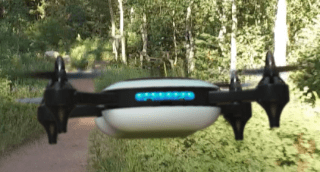George Matus founded Teal Drones in 2015 at just 18 years old, turning a high-school passion into a company recognized for its fast, modular drones with onboard computing power. Matus built Teal to deliver high-performance platforms for both consumer and enterprise markets. His early work earned him a Thiel Fellowship and a spot on Forbes’ 30 Under 30 list in Consumer Technology. (DRONELIFE first wrote about Matus in 2016: Teenager Raises $2.8 million for Drone Business.)


Teal’s trajectory gained momentum when it was acquired by Red Cat Holdings in 2021. Under Red Cat, Teal was selected to supply the U.S. Army’s Short Range Reconnaissance (SRR) Program—one of the most significant tactical drone contracts in recent years, valued at up to $260 million for more than 11,000 systems over five years.
The Lawsuit
On August 4, 2025, Red Cat Holdings and Teal Drones filed suit in U.S. District Court for the District of Utah, alleging that former CTO George Matus and his new employer, Vector Defense Inc., misappropriated trade secrets. The complaint seeks a preliminary injunction and expedited discovery under the Defend Trade Secrets Act.
Matus officially left Teal and Red Cat in December 2024. Soon after, he joined Vector Defense as Chief Technology Officer. At that time, Chris Rill, formerly Director of Partner Integration, was promoted to President of Teal Drones to lead the company through its next phase of production and delivery.
Who Is Vector Defense?
Vector Defense Inc. emerged from stealth in 2025, with co-founders including George Matus and Andy Yakulis. Industry reporting suggests that the company may have been conceived with a focus on tactical consultancy and integration rather than on full hardware development. At the time Matus joined, the company had not publicly released a completed drone product. Instead, Vector positioned itself as a future provider of next-generation technologies for defense clients.
Red Cat’s complaint argues that Vector’s early moves, along with Matus’s role, reflect an improper use of Teal’s proprietary knowledge and relationships. The lawsuit is intended to prevent what Red Cat characterizes as unfair competition at a critical moment for the company’s growth.
A High-Stakes Dispute
This legal dispute comes at a time when U.S. defense and public safety agencies are making significant investments in domestic drone capabilities. With the federal government focused on reducing reliance on foreign-made drones, programs like the Army’s SRR represent not only major business opportunities but also strategic milestones. Companies like Teal—and the people who helped build them—are now central to national efforts to strengthen the U.S. drone industrial base.
The lawsuit involving Matus highlights growing tensions over intellectual property and competitive advantage in this fast-evolving sector. It also raises questions about how startup founders transition into new ventures, and how emerging drone companies define the boundaries between innovation and appropriation.
George Matus’s story—from a teenage drone builder to the head of one of the country’s top tactical drone programs—is one of innovation and impact. With this lawsuit now in the spotlight, his legacy may be shaped not just by what he built, but by how the courts view what happened after he moved on.
Read more:


Miriam McNabb is the Editor-in-Chief of DRONELIFE and CEO of JobForDrones, a professional drone services marketplace, and a fascinated observer of the emerging drone industry and the regulatory environment for drones. Miriam has penned over 3,000 articles focused on the commercial drone space and is an international speaker and recognized figure in the industry. Miriam has a degree from the University of Chicago and over 20 years of experience in high tech sales and marketing for new technologies.
For drone industry consulting or writing, Email Miriam.
TWITTER:@spaldingbarker
Subscribe to DroneLife here.


